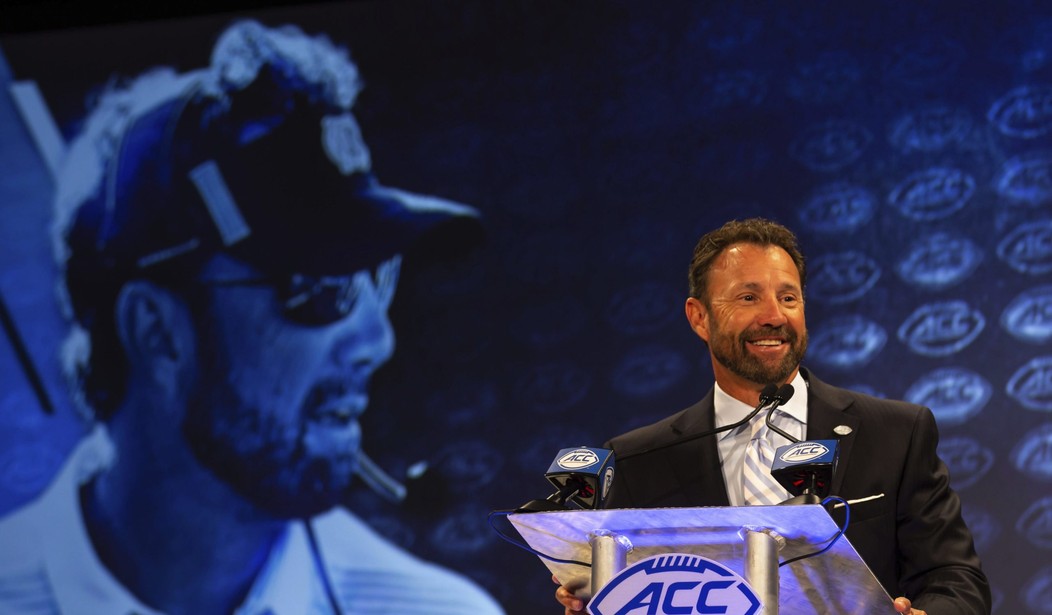For many conferences around college football, “Media Days” are this week. Coaches, administrators, and players from each team in a particular conference will spend several hours fielding questions and speaking to local and national media. Watching coverage of these events is like Comic-Con for college football fans.
The Atlantic Coast Conference (ACC) held its media event this week in Charlotte. North Carolina Tar Heels head coach Larry Fedora caused a stir with his remarks on the state of football today.
When addressing rule changes that protect players from concussions and chronic traumatic encephalopathy, also known as CTE, Fedora said that football is “under attack,” and with it the fabric of American culture. USA Today reports:
It hasn’t been definitively proven that football causes CTE, Fedora said during his appearance at Atlantic Coast Conference media days, but the fact that the connection has been made has impacted how people view the sport.
[…]
“Our game is under attack,” Fedora said. “I fear that the game will be pushed so far from what we know that we won’t recognize it 10 years from now. And if it does, our country will go down, too.”
And if you wonder how Fedora made that leap, he believes that one of the things that sets America apart from other nations is the fact that we play football here in the States.
Fedora also relayed the following anecdote: He spoke with a general – military branch unknown – and asked what made America’s forces the strongest in the world. It’s because the U.S. is the only country that plays football, the general replied, per Fedora.
Though Fedora claims that no one has proven a link between CTE and football-related head injuries, the Journal of the American Medical Association released a study last year in which 99 percent of the brains of deceased NFL players that had been donated to scientists had CTE, and the NFL has acknowledged a link between CTE and head trauma from football. The stats are astonishing.
So, is Fedora off-base in his assessment? You bet. Is he being melodramatic? Without a doubt. But now the controversy he has courted has led one columnist to call for Fedora’s head. USA Today‘s Dan Wolken believes that the coach should lose his job:
What Fedora said Wednesday — and doubled-down on repeatedly in front of dozens of reporters at the ACC’s preseason media event — isn’t just wrong, it’s toxic. And the fact he was arrogant enough to say it publicly in defense of some ridiculous machismo ethic that permeates the sport of football means he has crossed the line from responsibility into non-reality and is no longer fit for the job he now has.
Speaking of crossing lines, Wolken takes the time to parrot some reliably liberal political points. He’s off-base in his assessment of Larry Fedora too. Fedora doesn’t need to find himself in the unemployment line; he just needs to reconsider his position.
College football conferences and professional leagues consider rule changes with the best interests of players in mind, even when the enforcement of the rules leaves something to be desired (I’m looking at you, targeting call). New technologies will emerge that will help cushion the blow of even the toughest hits. Sure, football is changing, and sometimes we have to accept changes we don’t like in order to protect players, especially college athletes who aren’t paid — legally, at least.
Concerns about player safety are as old as the game of football itself. When Von Gammon, a football star at the University of Georgia (my alma mater), died after suffering a concussion in a game in 1897, three schools in the state — Georgia, Georgia Tech, and Mercer — voted to ban football. Gammon’s mother wrote a letter to her state representative asking for the schools to let football go on:
It would be the greatest favor to the family of Von Gammon if your influence could prevent his death being used for an argument detrimental to the athletic cause and its advancement at the University. His love for his college and his interest in all manly sports, without which he deemed the highest type of manhood impossible, is well known by his classmates and friends, and it would be inexpressibly sad to have the cause he held so dear injured by his sacrifice. Grant me the right to request that my boy’s death should not be used to defeat the most cherished object of his life.
The sport continues at all three schools today, and one of those teams went on to play in the national championship game in January (Go Dawgs). I honestly don’t see football going away anytime soon. We may not always agree with the changes to the game, and Lord knows I’ve done my share of complaining, but football is still a resilient and exhilarating enough of a sport to go on.
Sorry, Coach Fedora, but your fears are in the wrong place.










Join the conversation as a VIP Member